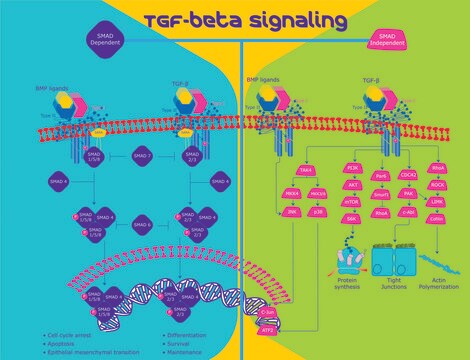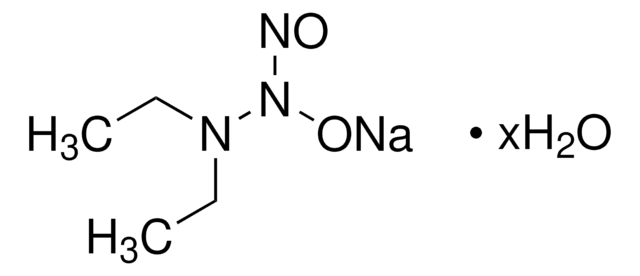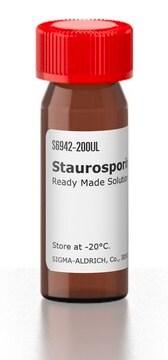GF346
Transforming Growth Factor-β1 human
Animal free, >98%, recombinant, expressed in CHO cells, suitable for cell culture
Synonym(s):
TGFb1, TGFbI, TGFB, Transforming Growth Factor-β1
Sign Into View Organizational & Contract Pricing
All Photos(1)
About This Item
UNSPSC Code:
12352202
eCl@ss:
32160405
NACRES:
NA.77
Recommended Products
General description
Product Source: CHO cells
The three mammalian isoforms of TGF-β (TGF-β1, TGF-β2, TGF-β3) signal through the same receptor and elicit similar biological responses. They are multifunctional cytokines that regulate cell proliferation, growth, differentiation and motility as well as synthesis and deposition of the extracellular matrix. They are involved in various physiological processes including embryogenesis, tissue remodeling and wound healing. They are secreted predominantly as latent complexes which are stored at the cell surface and in the extracellular matrix. The release of biologically active TGF- isoform from a latent complex involves proteolytic processing of the complex and /or induction of conformational changes by proteins such as thrombospondin-1. TGF-β1 is the most abundant isoform secreted by almost every cell type. It was originally identified for its ability to induce phenotypic transformation of fibroblasts and recently it has been implicated in the formation of skin tumors.
Recombinant human TGF-β1 is a 25.0 kDa protein composed of two identical 112 amino acid polypeptide chains linked by a single disulfide bond.
Recombinant human TGF-β1 is a 25.0 kDa protein composed of two identical 112 amino acid polypeptide chains linked by a single disulfide bond.
Application
Research Category
Stem Cell Research
Stem Cell Research
Research Sub Category
Growth Factors & Receptors
Growth Factors & Receptors
Quality
Determined by TGF-β1’s ability to inhibit the mouse IL-4-dependent proliferation of mouse HT-2 cells. The expected ED50 is ≤ 0.05 ng/ml, corresponding to a specific activity of ≥ 2 x 10^7 units/mg.
Physical form
Product is presented without additives and is filtered through a 0.2 micron filter before lyophilization
Storage and Stability
Store at -20°C for up to 4 months from date of receipt Centrifuge the vial prior to opening.
Reconstitute in water to a concentration of 0.1-1.0 mg/ml. Do not vortex. For extended storage, it is recommended to further dilute in a buffer containing a carrier protein and store in working aliquots at -20°C.
Reconstitute in water to a concentration of 0.1-1.0 mg/ml. Do not vortex. For extended storage, it is recommended to further dilute in a buffer containing a carrier protein and store in working aliquots at -20°C.
Disclaimer
Unless otherwise stated in our catalog or other company documentation accompanying the product(s), our products are intended for research use only and are not to be used for any other purpose, which includes but is not limited to, unauthorized commercial uses, in vitro diagnostic uses, ex vivo or in vivo therapeutic uses or any type of consumption or application to humans or animals.
Storage Class Code
11 - Combustible Solids
WGK
WGK 1
Flash Point(F)
Not applicable
Flash Point(C)
Not applicable
Certificates of Analysis (COA)
Search for Certificates of Analysis (COA) by entering the products Lot/Batch Number. Lot and Batch Numbers can be found on a product’s label following the words ‘Lot’ or ‘Batch’.
Already Own This Product?
Find documentation for the products that you have recently purchased in the Document Library.
Weili Ge et al.
Molecular medicine reports, 21(1), 478-484 (2020-01-16)
Endothelial to mesenchymal transition (EndMT) has been confirmed to participate in several cardiovascular diseases. In addition, EndMT of circulating endothelial cells (CECs) contributes to the pathology of musculoskeletal injury. However, little is known about the molecular mechanism of CECs undergoing
Ludong Zhang et al.
Artificial cells, nanomedicine, and biotechnology, 48(1), 648-655 (2020-02-20)
Recently, the functions of circular RNAs (circRNAs) on cancer initiation and development arouse wide concern. Herein, we tested the influences of circ-ZNF652 on renal carcinoma cell growth and metastasis. Firstly, clinical renal carcinoma tissues and corresponding normal tissues were collected.
Our team of scientists has experience in all areas of research including Life Science, Material Science, Chemical Synthesis, Chromatography, Analytical and many others.
Contact Technical Service



